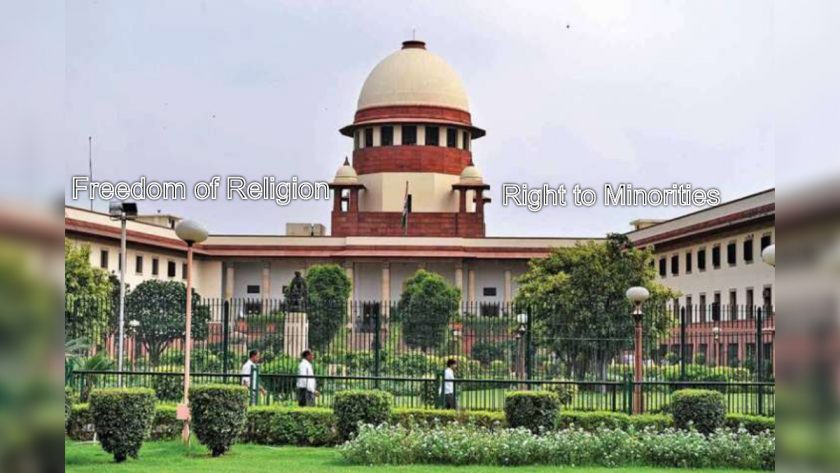What is Freedom of Religion and Right to Minorities?
The right to Freedom of religion in India is a fundamental right guaranteed by Article 25-28 of the Constitution of India. Modern India appeared in 1947 and the opening of the Indian constitution was amended in 1976 to state that India is a secular state for Freedom of Religion and Right to Minorities.

Right to practice and promote their religions peacefully
Every citizen of India has the right to practice, Freedom of religion, and promote their religions peacefully especially Right to Minorities. However, there are many incidents of religious intolerance which resulted in unrest and violence, especially the 1984 Sikh Genocide in Delhi, 1990 Anti-Hindu violence in Kashmir, Gujarat riots in 2002, and 2008 anti-Christian riots in Odisha. Some anti-nationals in the 1984 Sikh Genocide in Delhi has not been brought to justice despite widespread condemnation.
In the SR Bommai v. Union of India, Supreme Court of India decided that India has become a secular state from the time the constitution was adopted, what was done with this amendment is to state explicitly what was previously contained implicitly based on Article 25 to 28.
Jainism, Hinduism, Buddhism, and Sikhism
India is one of the most diverse in Freedom of religion/terms of religion, it is the birthplace of four major world religions: Jainism, Hinduism, Buddhism, and Sikhism. Although Hindu form nearly 80 percent of the population, India also has a religious practice of region-specific
Population & Religion in India
The country has a population of Muslims, Sikhs, Christians, Buddhists, Jains, and Zoroastrians significant. Islam is the largest minority religion in India, and Indian Muslims form the third-largest Muslim population in the world, accounting for more than 14 percent of the nation’s population.
For example, Jammu and Kashmir had a Muslim majority, Punjab has a majority Sikh, Nagaland, Meghalaya, and Mizoram has a majority Christian and Himalayan Indian states like Sikkim and Ladakh, Arunachal Pradesh and the state of Maharashtra and West Bengal Darjeeling district has a large concentration of Buddhist population.
Article 25: Freedom Of Conscience And Free Profession Of Religious Practice And Propagation Of Religion
(1) Subjected to public order, cause of death, health, and other provisions of this Section, everyone is equally granted to the freedom of conscience, Right to Minorities, and the right freely to profess, practice, and propagate religion.
(2) Nothing in this article shall affect the implementation of existing law or prevent the State from making any new law
(A) To regulate or restrict the activities of secular, economic, financial and political or any other that may be associated with religious practice – Freedom of religion;
(B) It provides for social welfare and reform or starting any religious institution of a public character to all classes and sections of people belonging to the same religion.
The explanation I: The wearing and carrying turbans by the Sikh community people shall be deemed to be included in the profession of the Sikh religion so that it can’t be restricted in Freedom of religion.
Explanation II: In sub-paragraph (b) of paragraph (2), the reference to Hindus shall be including to the people belonging to claimed Sikh, Jain or Buddhist religious community, and the reference to Hindu religious institutions shall be construed to them accordingly.
Article 26: Freedom To Manage Religious Affairs
This article is subjected to public order, cause of death, and health, every religious denomination or any part is entitled –
- To establish and maintain institutions for a religious and charitable purpose;
- To manage their religion’s own affairs in matters of religion;
- To own and acquire moving and immovable property; and
- To manage the property in accordance with the law.
Article 27: Freedom As A Tax Payments To Promote Any Particular Religious
No one will be forced to pay taxes, the result of which is specially adapted to the payment of fees to the promotion or maintenance of any particular religion or religious denomination.
Article 28: Freedom Of Religion As The Presence Of Instruction In Particular Religious Worship Or Educational Institutions
- No religious instruction must be provided in any educational institution which is fully managed from the government’s funds.
- Nothing in subsection (1) applies to educational institutions in Freedom of religion to run by the State but has been established under any lasting or belief which requires that religious instruction should be implanted in the body.
- No person attending educational institutions recognized by the State or receiving aid out of State funds shall take part in religious studies which may be delivered in the institution or to attend every service that can be done at the agency or at any location attached to it except the person or, if the person is a minor, his guardian has provided an additional approval.
Article 29: Protection Of Minority Interests
- Every group of the citizens living in the territory of India, as well as the jurisdiction of the Indian govt or any part thereof, has a different language, a script or a culture of its own has the right to conserve the same under this article.
- The citizens must not be denied entry into any institution of education which is maintained by the govt or receiving aid out of funds from the govt on the grounds only of Language, religion, caste, race, or any of them.
Article 30: Right Of Minority To Establish And Manage Educational Institutions
(1) All minorities present in India, whether based on religion or language, are provided with the Right to Minorities such as the right to establish and administer educational institutions of their choice applies in Freedom of religion.
(1A) In making any law providing for the compulsory acquisition of any property of an educational institution established and managed by minorities, as referred to the Right to Minorities in paragraph (1), the State must ensure that the amount fixed by or determined by the law for the acquisition of such properties as will not limit or revoke the rights guaranteed under that clause.
The State shall not, in providing grants in aid to the educational institution, can discriminate against any educational institutions in the nation which is under the management or operation of any person belonging to a minority community, the Right to Minorities, whether based on religion or language – Freedom of religion.
Case History
In 2002, the communal riots in Gujarat after the Godhra tragic incident. In this unrest, some 2,000 people lost their lives and as many as 567 religious places, including mosques, dargahs, and khankahs, somehow tainted, damaged, or destroyed which affected Freedom of religion & Right to Minorities.
State government to reconstruct and repair religious places
On February 8, 2012, the Gujarat High Court ordered the state government to reconstruct and repair religious places. And if the owner/manager has to have them repaired, to reimburse them. Gujarat government appealed to the Supreme Court against debating a court order high for the loss of property and Freedom of religion.
Under Article 226 can not pass such orders as the right to property after amendment 44
The remedy is provided in civil law and the high court in the written law under Article 226 can not pass such orders as the right to property after amendment 44 is not a fundamental right but only constitutional fundamental rights under Article 300A. It may be recalled that in the case of privacy as well, the government has confirmed that privacy is a common law right not a fundamental right.
Gujarat Government admitted that for violations of the right to life and personal liberty, the high court writ jurisdiction can be invoked to claim compensation for violation of fundamental rights. But for violations of other basic rights, such as the right to equality or freedom of speech, the action is that it can only be done by striking down laws that violate these rights.
Article 27 prohibits the use of taxpayer money for promotion or maintenance of religious denominations
In addition, India is a secular country, we can not spend government money for religious purposes as Article 27 prohibits the use of taxpayer money for promotion or maintenance of religious denominations. BJP as a party has said that the original constitution is not secular, and during the Emergency, Indira Gandhi put this term to appease minorities.

It is also argued the right to profess and practice freedom of religion does not include the right to profess and practice of ‘specific place’. In Ismail Faruqui, the apex court also has the odd claim that the mosque is not an ‘important feature of Islam,’ although it does not dispute Freedom of religion and Right to Minorities.
Contact the Best Lawyers for Constitution Litigation
Rajendra Law Office offers the Best Legal Consultation and Litigation Services with regards to Freedom of religion and Right to Minorities. Avail an Online Legal Advice or Virtual Legal Guidance. Get a Legal Assistance to defend or file a Writ petition with regards to Constitution Law. Legal Help is essential while there is a Violation in such constitution rights. Constitution Lawyers will offer the Best Legal Support.



